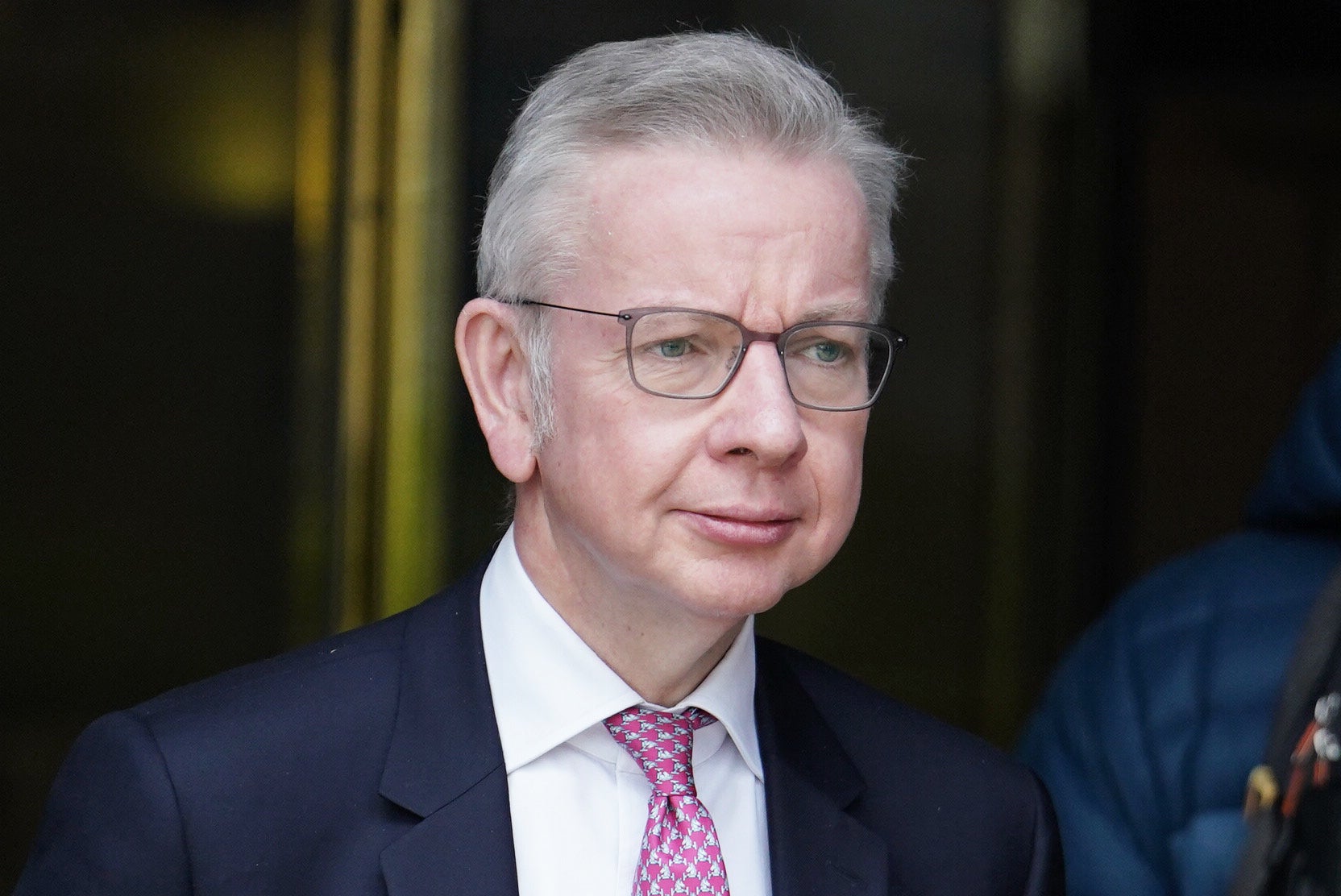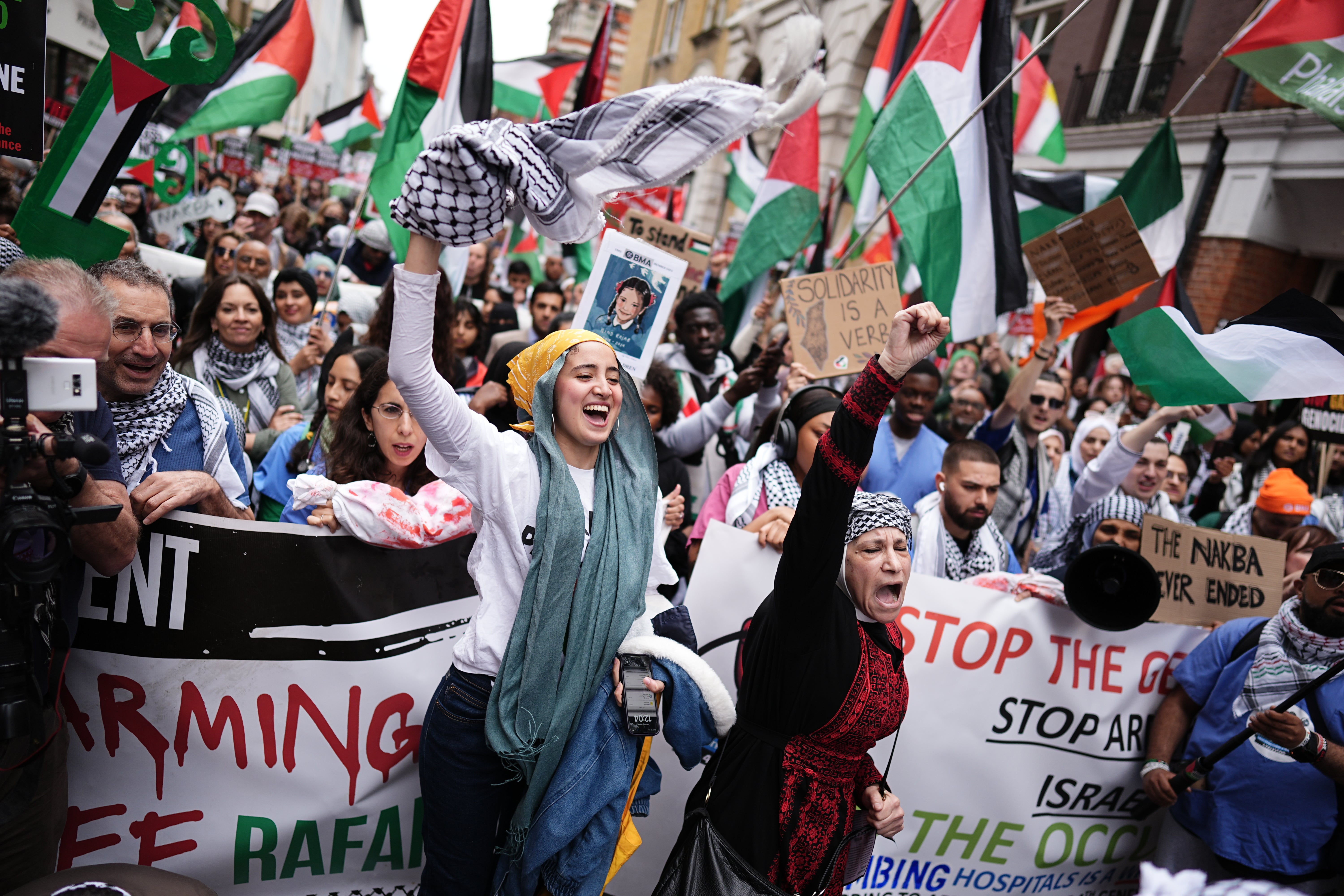
Michael Gove has provoked a furious debate by unveiling plans to “make marchers pay” for the massive pro-Palestinian protests dominating the centre of London at weekends.
In a hard-hitting speech this morning, Mr Gove warned of a huge rise in antisemitism in the UK, pointing out that the number of incidents was up 147 per cent last year.
He pointed to evidence from the Community Security Trust (CST) which stated that two-thirds of the 4,103 antisemitic incidents occurred on or after the Hamas attack on Israel on 7 October, which triggered the war in Gaza.
The communities secretary announced a number of measures to tackle extremism from Islamists, the far right and the extreme left, which featured in a series of recommendations from former Labour MP Lord Walney in a report on the subject.
The report, published today, included references to pro-Palestinians and climate change activists such as Just Stop Oil. He warned that the UK is “at a crossroads” as he laid out 41 recommendations, including:
- Tightening laws to ban Gaza protests on certain days such as Remembrance Sunday
- Making it easier for businesses to pursue organisers of protests for damages
- Making protest groups pay for policing
- Banning protests near parliament and creating a buffer zone around MPs’ offices
- Police and CPS should apply the law more broadly to crack down on people praising terror groups
- Not automatically suspending teachers in blasphemy row

Lord Walney has also called on ministers to expand the Public Order Act 1986 so that police have greater powers to stop marches from going ahead.
Politicians expressed “grave concerns” about pro-Palestine protests over Remembrance weekend last year, and there was disruption as right-wing groups set out to confront the marchers.
Mr Gove’s speech came as the High Court ruled that government attempts to lower the threshold for police to tackle serious disruption in marches and protests were “unlawful”.
‘Work of fiction’
Campaign groups seized on the legal judgment as one of the reasons that Mr Gove and Lord Walney’s recommendations should be dismissed.
They also pointed out that Lord Walney – John Woodcock – had been a chair of the Labour Friends of Israel and alleged he had business interests which could call into question his judgement on arms sales and tackling climate change.
A Just Stop Oil spokesperson said: “History will come to regard the acts of this government and its cronies as the real criminals, which is why they will stop at nothing to silence those telling the truth and acting like we are in the emergency that we are in.”
Glen Secker, a member of the executive committee of Jews for Justice for Palestinians, said: “Michael Gove’s remarks is a work of fiction. It resembles nothing to the reality. Each 1,000 members of us at JJP attend demonstrations each time and we are welcomed by everybody. There is no hostility.”
On Jews not being accepted at pro-Palestinian marches unless they agree to the destruction of Israel, he added: “It is a fictional line, you wouldn’t get organisations like us to obey his instructions on what we can or cannot say.”
International Centre of Justice for Palestinians public affairs officer Jonathan Purcell said: “The Woodcock report sets a dangerous precedent. It will inevitably be used to support Gove’s new ‘extremism definition’, which seeks to crack down on protest rights in the UK.”
The Palestinian Solidarity Campaign director Ben Jama said: “The resumption of these baseless attacks by Michael Gove and John Woodcock amount to an admission: apologists for Israel’s genocidal violence and system of apartheid have lost the democratic and legal arguments, but continue to attempt to delegitimise Palestinian solidarity. They will not succeed.”
‘Public abhors extremism’
Other campaign groups welcomed Mr Gove’s speech and Lord Walney’s recommendations.
The Campaign Against Antisemitism said in a statement: “Lord Walney lays bare how far our branches of law enforcement have fallen behind these extremist groups and the expectations of the British public, which abhors extremism and the use of illegal or intimidatory tactics to accomplish goals that cannot be secured at the ballot box.
“Organisers of the protests must no longer be permitted to hide behind excuses of ‘a few bad apples’ but finally held to account. We fully support Lord Walney’s recommendations, a number of which echo proposals that we have recently made to the Home Office and other departments. Our criminal justice system must be brought into line, and the laws on which it operates must be brought up to date.”
The Community Security Trust (CST), which provides protection for the Jewish community in the UK, said: “The growth of antisemitism in this country since 7 October is appalling, including the repeated presence of antisemitic and extremist rhetoric on anti-Israel protests, and there is a strong sense that this balance has been lost. Consequently, we welcome Lord Walney’s recommendations for strengthening laws relating to political protest, political violence and disruption. We thank Lord Walney for his efforts and will look to work with government to support the implementation of his recommendations.”
Karen Pollock, chief executive of Holocaust Educational Trust, said: “For far too long, our city centres have been filled with violent chants and placards calling for the elimination of the Jewish state of Israel. Antisemitism has become commonplace, with medieval tropes modernised to attack the only Jewish state, the Jewish star of David compared to a swastika and Zionism being equated to fascism. Jewish people, like everyone else in this great nation, should feel safe on our streets and these recommendations are the first step in ensuring this becomes the case once again.”
Mr Gove declared that the Boycott, Divestment, Sanctions (BDS) movement on the left, directed at boycotting Israeli academia and businesses, is “antisemitic”.
Among his measures was a threat to “make marchers pay” for the repeated disruption and cost of policing.
He said: “I don’t want to make it unaffordable for groups to protest but when groups protest again and again and again, then I think it is fair to ask them to pay.”
Lord Walney recommended in his review that protest organisers contribute to the policing costs of their demonstration. He said UK democracy was “at a crossroads” and must be defended from extremists on the left and right.
Mr Gove also urged Labour peers to stop slowing down the progress of legislation to allow antisemitism to be tackled more effectively.
He said there will be national advisers on antisemitism and hatred against Muslims.
But in a speech which warned of the UK and other Western democracies “descending into darkness”, Mr Gove said that the organisers of marchers had not done enough to tackle “antisemitic tropes” such as the singing of “From the River to the Sea” which is understood to mean the destruction of the state of Israel.
He said he has also been alarmed by Nazi symbols on marches.
The event was hosted in north London at the JW3, the only Jewish community and arts centre in the UK.
Addressing an audience of Jewish community leaders, Mr Gove spoke of his horror of how antisemitism had quickly erupted “within hours” of Hamas’s brutal attack on 7 October, the worst single loss of life of Jews in a day since the Holocaust.

‘A virus’
Quoting the late chief rabbi Jonathan Sachs, Mr Gove said that “antisemitism is a virus that evolves”.
He said it had gone from medieval religious hatred to an “attempt to delegitimise the state of Israel”.
Mr Gove argued that attacks on Israel were “attacks on Western values”, particularly by Marxists, and he pointed out that supporters of antisemitic movements include Iran, Russia and China.
Comparing the treatment of Israel’s attempts to defend itself to atrocities around the world by largely left-wing protesters, Mr Gove said: “There are no BDS campaigns directed against Bashar Assad’s Syria regime guilty of killing more Muslims in living memory than any other. There are no student encampments urging university administrators to cut all ties with China.
“Given what is happening in Xinjiang or Hong Kong, or what happened in Tibet, I know of no efforts to organise marches in their thousands to demand immediate action to stop the persecution of the Rohingya or Korean people by Myanmar’s government.
“I may have missed it, but agitation to end the war in Sudan, or in the Democratic Republic of Congo, or Mali, or Ethiopia, does not seem to energise our campuses. And nowhere is there any suggestion other than with Israel, that the errors or even crimes of a country’s leaders should necessitate the end of that country’s independent existence.”
Referring to an anti-Western agenda behind the attacks on Israel, he went on: “The decolonization narrative is meeting during the idea that the success of liberal Western nations is built on plunder and exploitation, that we seek even now to dominate others through illegitimate means, and that our attachment to freedom as mere hypocrisy is central to their efforts to advance their goals.
“That is why forces within those powers seek to influence the debate in our country. They want to weaken our collective resolve in support of democratic values, and fellow democracies. And they know that if they cannot undermine support for Israel, by encouraging a broader lack of self-confidence in the West’s values, they have secured a signal victory.”
Apart from Mr Gove’s speech, political reaction was muted. A Labour source said the party needed time to study the 41 recommendations. Home secretary James Cleverly said he would carefully consider the report.
The High Court
But there was a blow to the government in its attempts to tackle the pro-Palestinian marches, with the High Court ruling against the lowering of the threshold for police to intervene.
Civil liberties group Liberty had brought legal action against the Home Office over protest regulations passed by statutory instrument last year.
The government measures lowered the threshold for what is considered “serious disruption” to community life, from “significant” and “prolonged” to “more than minor”.
The changes were made to tackle groups like Just Stop Oil from blocking roads but also impacted pro-Palestinian demonstrations.
They would have allowed police officers to take into account “any relevant cumulative disruption” of repeated protests.
The regulations came after the government tried to introduce the same changes when the Public Order Bill went through parliament, but they were rejected by the Lords at the time by 254 votes to 240.
Two judges ruled for the group, finding the Home Office acted outside of its powers by reducing the threshold and failed to carry out a fair consultation process.
Lord Justice Green and Mr Justice Kerr said: “As a matter of ordinary and natural language, ‘more than minor’ is not within the scope of the word ‘serious’.”
The judges continued: “Under section 2A(b), when considering whether a public procession or assembly may result in ‘serious disruption to the life of the community’, a senior police officer ‘must’ take into account all relevant disruption and ‘may’ take into account any relevant cumulative disruption.
“If we are correct in our conclusion that ‘serious’ does not include ‘more than minor’, that affects how the police apply the connected concepts of ‘disruption’ and ‘cumulative’ because it is critical context to those provisions.”
As the regulations were approved, the then home secretary Suella Braverman argued the changes would provide “further clarity” for police.
She told MPs in June 2023: “People have a right to get to work on time free from obstruction, a right to enjoy sporting events without interruption and a right to get to hospital.
“The roads belong to the British people, not a selfish minority who treat them like their personal property .... In some cases, the protests have aggravated the public so much that they’ve taken matters into their own hands.
“They’ve lost their patience, the police must be able to stop this happening and it’s our job in government to give them the powers to do so.”







